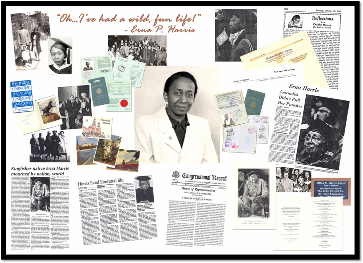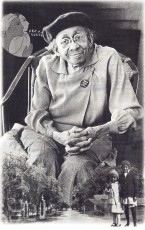ERNA HARRIS

TRIBUTE FOR DR. ERNA P. HARRIS
by Janine R. Wedel
Hi, I'm Janine.
• One of the first thoughts I had after being called about Erna's death was regret. Regret that other people wouldn't have the same opportunity that I had to know Erna. And in thinking about what I would say today, I reflected on what it was about Erna that made her so special - and a guiding influence in my life.
We met at a peace research and education conference at Kent State University in Ohio more than 15 years ago. I was a young woman in my early 20s and she was exactly 50 years older than I was. To this day, I don't fully understand why she chose to make me her friend. I do know that she was a guide to me during critical years of my life and that I am very privileged to have known her.
• What made Erna so special? It wasn't just her wealth and breadth of knowledge - from Middle Eastern history and politics to opera and baseball. It was her approach to life--her wisdom and insights into the world around us. Let me give you an example. During the 1980s I spent many years in Poland at a critical point in that nation's history. It was martial law, the aftermath of the Solidarity revolution. I saw and experienced things that few Americans ever really get to see. And when I returned home to Berkeley, where I was pursuing a doctorate, it was important for me to be able to talk to someone about them. Erna was the only one I could really reach out to and talk to about these things - she was the only one who seemed to understand. I don't know how or why she understood: She hadn't been there, she hadn't seen the same things that I had. And yet her depth of understanding was so great that she even connected with the Polish women I lived with and saw what made them tick. Erna was a mother/mentor and a friend.
• What made Erna so special was also that she was liberated. She liberated herself from what society and people might think. She liberated herself from the actions of organizations and governments. She made choices that put her own financial security at risk.
To be sure, this liberation was not bestowed upon her from outside. It was liberation from inside, from her sense of integrity, her sheer strength of character and courage of conviction. Erna exercised liberation against incredible odds and obstacles.
• How did Erna get to be who she was? Well mostly it was just Erna but she also had the right kind of guidance from her parents. Erna was named after a Jewish woman her parents knew. She was born and raised in Kingfisher, Oklahoma, a small town about 40 miles northwest of Oklahoma City. Erna, her parents, and her sister, Gaynell, whom she adored - were a close and fun-loving family, often playing practical jokes on one other.
Erna's father was a respected leader in the community and follower of Mahatma Gandhi. His manner earned him the respect of both Black and White people, and this in Ku Klux Klan country. He worked as a mail carrier until a ruling barring Blacks excluded him. Eventually he found work in a feed store.
Erna's mother could count on Erna's unbounded curiosity. "If it rains here in Kingfisher," Erna recalled asking her mother, "is it also raining in Africa?" In the 1910s, without modern communications like the weather channel, there was no way to know. Her parents finally saved enough money to buy her an encyclopedia and answer this and I'm sure many other questions.
I wanted to know more about Erna's young life. So I spent some hours on the phone tracking down people in Kingfisher, Oklahoma - people who knew Erna in Kingfisher 70 and 80 years ago.
Kingfisher, the county seat, was divided into two parts ¬Negro and White - separated by railroad tracks. At the time Erna was growing up, Kingfisher had 50-75 Black families. The families were Baptist and Methodist. Erna's family was Methodist, belonging to the AME Church. One contemporary of Erna's in Kingfisher remembers that Erna's house - the Harris house - was nicer than most houses on their side of the tracks - because it had paint on it.
Erna went to the only school in town she could - Douglas School - the Negro school, which had all grades - 1-12 - and fewer than 100 students. Contemporaries of Erna remember her as "very sweet," "very nice," and, to hear the men tell it, "very pretty." She played volleyball, tennis, and basketball. One woman recalls Erna as a 9th or 10th grader participating in the annual competition in writing, poetry reciting, spelling, and so on held at the Douglas School for all the area Negro Schools. Erna won the spelling competition one year. This woman also remembers Erna reciting poetry - and a speech she gave in high school in which she singled out a classmate for teasing by saying, "He's just like a paper bag puffed full of wind." That's Erna telling it like it is at an early age. And the poor guy she was describing was her suitor for many years.
As you know, Erna was one of the few African-American woman to attend college during the depression, (Wichita University in Wichita, Kansas), which she chose over scholarships to segregated universities in Oklahoma. She graduated in 1936. Nine years ago she attended her 50th college reunion in Wichita, Kansas, and stayed with my family (I grew up in Kansas not far from Wichita). The reunion with classmates jogged her memory. I remember her reminiscences:
- About the White people whose houses she cleaned to work her way through school;
- About the mixers she attended when other Black students were too intimidated to go;
- About the praise the college newspaper, The Sunflower, earned with Erna as its news editor in her senior year and about the awards she won in journalism – the first freshman, woman, and Black to win these awards;
- And about how disappointed her professor was when the town newspaper came to take a picture of the prize-winning student only to go away with no picture when they saw she was Negro.
• Erna remained a liberated person. This enabled her to start her own paper in Wichita when she couldn't get a job because of her skin color, and to write against the internment of Japanese-¬Americans, even though this resulted in having to close the paper several years after the first issue because she had lost her advertising. The fact that Erna was liberated enabled her to start "bias" news services, because, to hear her tell it, everyone has biases and it's best to be up front about them. The fact that she was liberated enabled her to befriend and take in a German woman during World War II, to expose the Red Cross practice of segregating White from Negro blood (and sometimes throwing out the Negro blood), and to withstand the resulting FBI harassment. Erna's liberated spirit encouraged her to learn enough Spanish to chat with her neighbors. It encouraged her to learn enough Russian - before traveling to the Soviet Union in 1964 with a WILPF delegation - to so impress professors at Moscow State University ¬that they offered her a full scholarship for a year.
The fact that Erna was liberated enabled her to remodel old cars for fun, to be a good basketball player despite the fact that she was short, to pass up drugs when everyone else was using them, and to go out instead of to board meetings on Saturday nights. (Indeed, she rarely let a Saturday night slip by without attending a concert or going dancing. One of the first social activities we did together was dancing and this after age 70.)
The fact that Erna was liberated meant that she enjoyed chatting up cab drivers, that she insisted on real coffee, and that she read the humorist Robert Benchley when everyone else was reading Freud.
• Erna always told me that people today place too much emphasis upon "career tracks" instead of going out, experiencing life, trying different things, and finding out what you like and what you don't like. She adopted one of singer Eartha Kitt's songs as her motto: "All I Want is All There Is." "That's all I want," she said. "I'm always afraid it's not all there, and so I go looking."
Years of observing Erna interact in many different settings with grace, intelligence, charm, and wit, has inspired me. Erna was an authority on living and knowing her has changed my life. Simply knowing that there is someone in the world like Erna who makes the choices she does - made a tremendous difference in my life.
The world is a different place without Erna. But Erna's wisdom, integrity, and liberated spirit will live on. I believe all of us who knew her have a responsibility to live them and to share them with others. I am still in awe of her.


